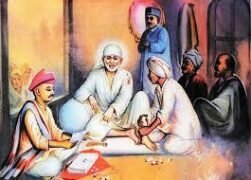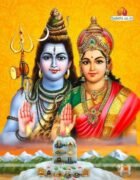By: Sri Radhakrishna Swamiji
A Pundit came to Shirdi and requested Sai Maharaj’s permission to give a discourse on Kena Upanishad in the mosque. Sai Maharaj readily agreed.
The discourse started. When asked by a devotee, “Kenesitam patati presitam manah” – by whom and who’s will the mind be directed towards objects – in the opening lines of the Kena Upanishad, the Pravachankar narrates a parable of three gods and the goddesses. Placing it in the context of a war, the story narrates how the righteous forces, Devas, have prevailed over the violators, the Asuras.
Now having won, Devas are congratulating themselves and gloating over their victory and the special powers that enabled it. The story goes, therein appears a brilliant Luminous form ‘Yaksha’. Gods are taken aback at this luminous form and feel challenged by the radiance of this Being. They ask the fire God ‘Agni to find out who this Being is. Agni introduces himself as a God with the special power to burn and turn to ashes everything in the Universe. The Yaksha places a blade of grass in front of Agni and tells him to burn it, or else shed this vanity of strength. With all his skills, Agni is unable to burn the blade of grass and withdraws, his spirits deflated.

Gods then call upon ‘Vayu’ to challenge and get to know this enigmatic Yaksha figure. Vayu too is called upon by the Yaksha to show his special powers. But with all his powers to blow away everything in his path, Vayu is unable to move the blade of grass, and retreats in despondency, his ego shattered.
In his ‘Bhashya on the Kena Upanishad, Adi Shankara alludes to the cause behind the sudden disappearance of the Yaksha figure, stating that Indra was the vainest of the gods, and the greater this vanity and self-absorption, the farther the divine grace drifts away from that person. The ego and divinity are diametrically opposite.
Indra stands rooted, perplexed at the turn of events, his jignasa, his desire to know this Being intensifies. The seeking of the truth puts him in a reflective state of mind and gets the better of his self-absorption. As his vanity gets subsumed in his seeking, Parvati, the great Goddess, appears in front of him in a splendiferous form, Shobhavati Uma Haimavati – the omniscient consciousness of creation. She tells Indra that the Being that had vanished was indeed Brahman. In revealing the existence of Brahman to him and Devas, she guides them to the realization that it was Brahman who drove Gods to victory over the Asuras and they are but instruments.
intensifies. The seeking of the truth puts him in a reflective state of mind and gets the better of his self-absorption. As his vanity gets subsumed in his seeking, Parvati, the great Goddess, appears in front of him in a splendiferous form, Shobhavati Uma Haimavati – the omniscient consciousness of creation. She tells Indra that the Being that had vanished was indeed Brahman. In revealing the existence of Brahman to him and Devas, she guides them to the realization that it was Brahman who drove Gods to victory over the Asuras and they are but instruments.
Suddenly Bayaja Maa came there and waved ‘Pancharati’ to Sai Maharaj. The Pravachankar immediately declared that Sai Maharaj was the ’Parabrahman.

Leave a Reply